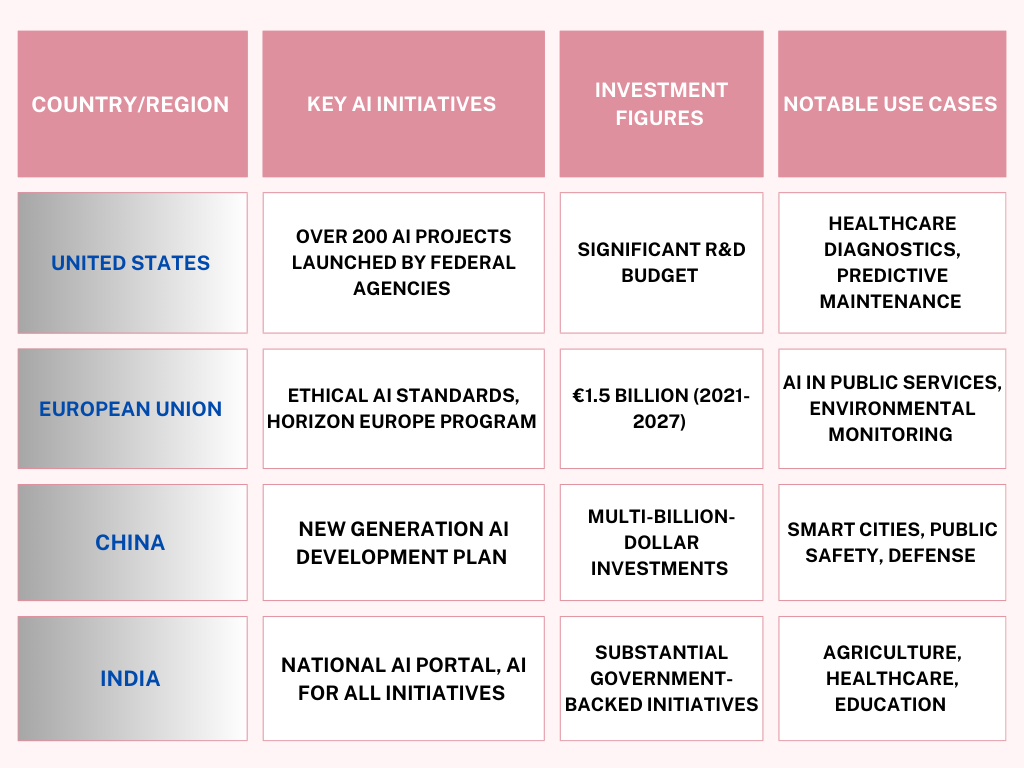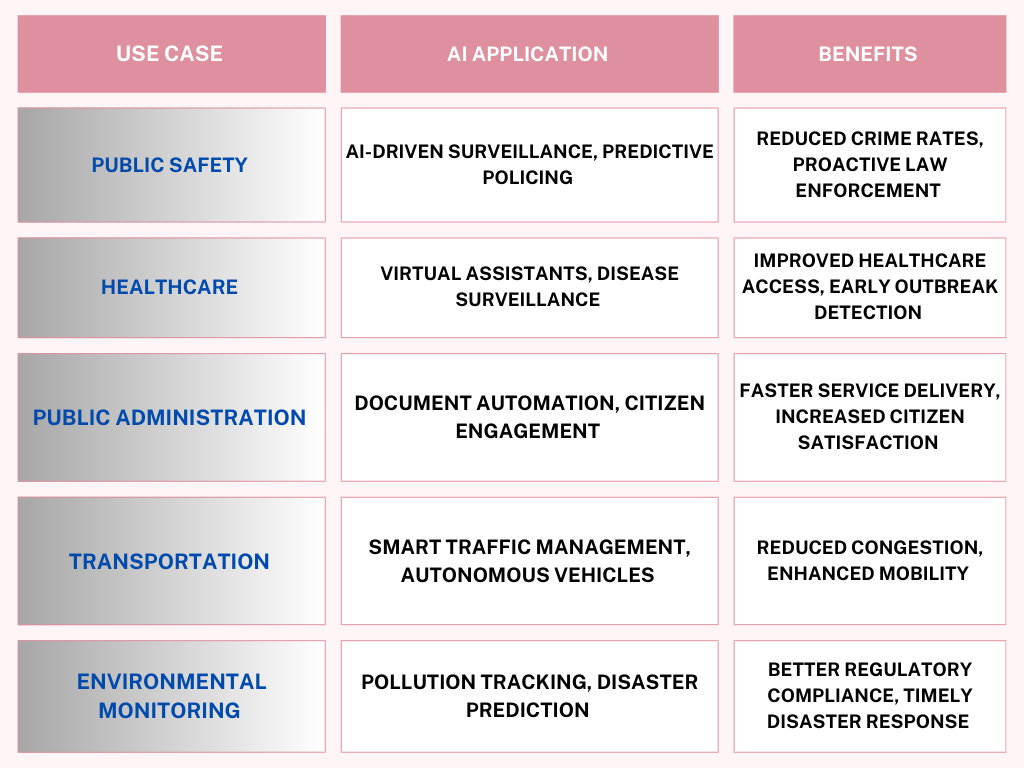
-
Apexlink
Real Estate
-
DLS
General Insurance
-
DMV
Government
-
Entiger
Fintech
-
GIS Mapping
Gas & Petroleum
-
HMS
Employee Benefit
-
HAWA
Government
-
Harley
Community
-
IHG
Hotel & Tourism
-
Sparkseeker
Humane Tech
-
Track Ninja
Sports
-
Response Vision
Disaster Management
- AI/ML Services
- Application Services
- Automation Services
- Cyber Security
- Chatbot Experts
- Data Analysis
- Data Warehouse Services
- Digital Commerce Services
- Digital Transformation
- Infrastructure Service
- Low Code/No Code
- Managed IT Services
- IT Support
- IT Consulting
- IT Outsourcing
- Mobile App Development
- IOS Development
- Android Development
- Cross Platform Development
- Gaming App Development
- Software Development
- System Design & Architecture
- Testing Services
- Web Development
Accelerators
POCs and Products
Artificial intelligence is no longer a futuristic concept, but a practical and transformative force that is impacting almost every industry. One of the most significant areas where AI is making a mark is governance. Governments worldwide are beginning to understand how artificial intelligence can improve public administration, help deliver better citizen services and address complex challenges with greater precision. While the potential benefits are immense, the adoption of artificial intelligence solutions in the public sector comes with its own set of challenges. This blog explores how various governments are incorporating AI into their processes, the considerations involved in its implementation, its diverse applications, ethical concerns, potential risks involved, and how Seasia Infotech can help public sector services providers and organizations better navigate this space.
Global AI Adoption in Government: A Snapshot
Artificial intelligence adoption in the government sector is rising at a steady speed, led by the demand for improved efficiency, data-centric decision-making, and enhanced citizen engagement. Several countries across the globe have made significant strides in integrating AI into their governance frameworks. Here are some key highlights:

Can you tell what’s common in these examples? They illustrate a global trend where governments are not only investing in AI technology but also creating policies to regulate and promote its ethical use.
Key Considerations for AI Adoption in Government

Even with all the benefits it offers, introducing AI in the public sector is a complex process that may require addressing hundreds of factors to ensure successful results. Some noteworthy considerations among these have been listed below:
1. Strategic Alignment
AI initiatives must align with a country’s strategic goals. This can be made sure by identifying specific areas where artificial intelligence services can create the maximum impact, such as public health, infrastructure management, law enforcement, and more. Strategic alignment also assures that AI investments are leading to measurable improvements in governance.
2. Data Governance
Data is the foundation of AI systems. For governments, managing huge amounts of data efficiently and securely is more crucial than ever. That explains why governance policies should focus on:
- Data Privacy: Ensuring that citizens’ personal information is protected.
- Data Quality: Maintaining high-quality, accurate data to train AI models effectively.
- Interoperability: Ensuring that different government departments can share and use data seamlessly.
3. Infrastructure Readiness
Another important requirement for the successful deployment of artificial intelligence for government is robust IT infrastructure. This could include cloud computing capabilities, high-speed networks, and advanced data centers. Governments must invest in modernizing their existing infrastructure to support AI-driven applications.
4. Talent Development
AI expertise is in high demand, and governments need skilled professionals to develop, deploy, and manage AI solutions. Investing in AI education, training programs, and partnerships with academic institutions could be immensely helpful in building a talent pipeline.
5. Ethical AI
Governments must also prioritize the ethical use of AI by ensuring transparency in AI decision-making processes, minimizing biases, and establishing clear accountability mechanisms. Ethical AI plays a rather important role in garnering public trust and ensuring that AI systems are used responsibly.
Use Cases of AI in Government
Artificial intelligence in government sector has the potential to transform almost every aspect of governance. Here are some of the most impactful use cases:
Public Safety and Security
Governments in many countries are using AI to enhance public safety and national security. Examples include:
- Advanced AI-powered surveillance systems equipped with facial recognition and anomaly detection capabilities help law enforcement agencies prevent crimes.
- By analyzing historical crime data, AI can help predict where crimes are likely to occur, enabling proactive measures for predictive policing.
Healthcare
AI is playing an important role in improving healthcare services offered by governments. This typically includes disease surveillance using AI systems that analyze health data to detect outbreaks and respond more rapidly. In addition to that, AI-powered chatbots provide citizens with accurate health information and guidance, reducing the burden on healthcare professionals.
Public Administration
AI can streamline bureaucratic processes and improve public service delivery to a great extent. Two noteworthy applications are:
- Automated Document Processing: AI in government automates routine tasks such as document verification and data entry for faster service delivery.
- Citizen Engagement: AI-powered chatbots and virtual assistants help citizens access information and services efficiently.
Transportation
AI is widely being used to transform transportation management in urban and rural areas. For instance, it supports smart traffic management through AI systems that analyze traffic patterns in real time to optimize traffic flow and reduce congestion. Certain governments are also testing self-driving vehicles for public transportation and logistics.

Environmental Monitoring

Governments are keen on leveraging AI to address environmental challenges like:
- Pollution Monitoring: AI-powered sensors track air and water quality to provide real-time data for regulatory actions.
- Disaster Management: AI systems predict natural disasters such as floods and earthquakes, which helps send out timely responses.
Here’s a quick summary:

Ethical AI in Government
As AI becomes more integral to governance, we must address ethical concerns to prevent misuse and ensure fairness. The following form the pillars of ethical AI in government:
- Transparency: Citizens have the right to know how AI systems are making decisions that affect their lives.
- Fairness: AI systems should be designed to treat all citizens equally. They must be designed to avoid biases that could potentially lead to discrimination.
- Accountability: Clear guidelines should be in place to determine who is responsible when AI systems fail or cause harm.
- Privacy: Protecting citizens’ data is paramount. Implementing strong data protection laws is not enough, government must also ensure that AI systems comply with them.
Risks and Resolutions
While AI offers significant benefits across different government processes, it also presents risks that need to be managed effectively. Let’s discuss some of the more common risks and potential solutions here.
Bias and Discrimination
Risk: AI systems sometimes accidentally repeat the biases found in the data they were trained on. This can lead to unfair outcomes in areas such as law enforcement or social services.
Resolution: Regular audits, diverse training datasets, and the use of bias mitigation techniques can help identify and address biases in AI systems. Additionally, creating AI ethics boards to oversee the deployment of AI solutions can ensure fairness.
Security Threats
Risk: AI systems are vulnerable to cyberattacks, which can compromise sensitive government data or manipulate AI-driven decisions.
Resolution: Implementing stringent cybersecurity measures, including advanced encryption, intrusion detection systems, and frequent security assessments, can mitigate these risks. Governments can also collaborate with cybersecurity experts to develop more resilient AI systems.
Job Displacement
Risk: Automation of certain tasks could lead to job losses in specific sectors, particularly in roles involving routine or manual tasks.
Resolution: Governments can introduce reskilling and upskilling initiatives to help workers transition to new roles. Offering public-private partnerships for AI training programs can further facilitate workforce adaptation.
Privacy Concerns
Risk: The use of AI in surveillance and data analytics can raise significant privacy concerns among citizens.
Resolution: Strong data protection regulations, such as anonymization techniques and strict data access controls, can help mitigate privacy risks. Governments should also engage in public consultations to build trust in AI deployments.
Dependence on AI
Risk: Over-reliance on AI systems without human oversight can lead to critical errors or unintended consequences.
Resolution: Governments should maintain a human-in-the-loop approach, ensuring that AI systems augment rather than replace human decision-making. Regular performance reviews and fallback mechanisms can further enhance system reliability.
How Seasia Infotech Can Help
Seasia Infotech has extensive experience in delivering Artificial intelligence services tailored to the unique needs of public sector organizations. Here’s how we can assist:
1. Strategic AI Consulting
We work closely with government agencies to develop comprehensive AI strategies that align with their goals and priorities perfectly.
2. Custom AI Solutions
Our team designs and deploys AI solutions that address specific challenges faced by governments, helping ensure measurable outcomes.
3. Data Management & Analytics
We help governments build robust data ecosystems, enabling efficient data collection, storage, and analysis.
4. Ethical AI Implementation
Seasia ensures that all AI solutions adhere to ethical standards, promoting transparency, fairness, and accountability.
5. Training and Capacity Building
We offer training programs to equip government employees with the skills needed to manage and leverage AI solutions effectively.
To Sum It Up
The power artificial intelligence holds in government sector is incomparable. It can improve processes severalfold and take public services a level up, all while supporting better decision-making. However, keep in mind that reaping these benefits requires careful planning & certain ethical considerations in addition to effective risk handling. By becoming partners with Seasia Infotech, governments can confidently get started on their AI journey and rest assured that their initiatives are responsible, sustainable, and impactful.








 Blockchain
Blockchain Cloud Computing
Cloud Computing Infrastructure
Services
Infrastructure
Services Metaverse
Metaverse QA
Automation
QA
Automation UI/UX
UI/UX







